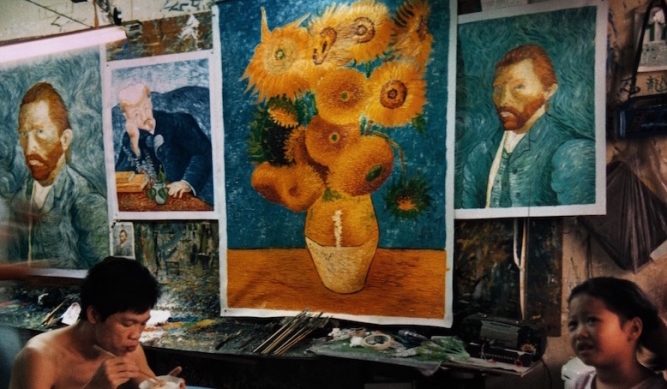The Kickoff of Apriti Cinema’s Free Florence Outdoor Movies

For the second time, Italy’s Apriti Cinema will embrace Uffizi Square to screen nearly two months of nationally and internationally acclaimed titles for this summer’s film festival. Previously held in Piazza SS. Annunziata, the film series transferred to Uffizi Square in 2017 and is now in its seventh year of summer programming. Expanding upon last year’s 23 day showing, this year’s itinerary boasts 48 consecutive showings, beginning June 25 and concluding August 11.
Apriti Cinema anticipates this year’s festival will reach approximately 10,000 viewers: an audience of both Italians and foreigners. Considering the diversity of audience members, each film will be shown in its original language with Italian subtitles additionally displayed on the screen. The festival offers free admission, though seating is limited to the 200 chairs in Uffizi Square. Given an overflow of guests, movie-goers may watch the films from the steps beneath the Uffizi loggia.
This year’s scheduled screenings will feature 12 international festivals, including: the Festival dei Popoli, River to River, Middle East Now, Cinema and Women, the Balkan Florence Express, the Florence Korea Film Fest, the Dragon Film Fest, the Florence Queer Festival, the Entomusicale festival, the N.I.C.E., and A Window on the North. Showing selections from each festival, Apriti Cinema does not have one central theme and will instead present films suitable for many audiences.
Showing multiple films from certain film festivals, Apriti Cinema will conduct a series of mini-festivals. These individual festivals will focus on recurring themes ascribed to a particular day of the week. The first of these thematic series’ will begin with June 22’s launch of Monday evenings’ “Midsummer Nights” showings. Released earlier this year, Rian Brown and Geoff Pingree’s The Foreigner’s Home will introduce the series in an exploration of Tony Morrison’s work, focusing on her 2006 exhibition of the same name curated at the Louvre. The documentary synthesizes archival research, conversations with Morrison, and dialogue between other artists to comment on race, identity, and the condition of foreignness within modern society.
Three additional films under the “Midsummer Nights” subheading will follow The Foreigner’s Home. July 2 will feature the Czech film Koudelka Shooting Holy Land, while the following Monday will present three shorter movies created by Italian filmmakers. China’s Van Goghs will close out the series on July 16, cataloguing a Chinese painter’s dream of visiting the Van Gogh Museum and the steps he takes to turn that dream into reality.
Middle East Now will present Tuesday evenings’ films, which the festival categorizes by different colors and their symbolic meanings. The two films shown on June 26 encapsulate the color blue: the search for peace, security, freedom, and protection. Both released in 2017, these films depict the aftermath of violence and the identities that emerge in times of chaos. Expanding upon these tensions, the next week offers films that intertwine the Middle East with the color red—anger, fear, rebellion, determination—while July 10 documents the overlap between resistance and hope through the color yellow. The Tuesday evening mini-series concludes on July 17 with the film When God Sleeps, categorized by the color green and the corresponding themes of spirituality, tradition, and freedom.
The first of the festival’s British films will be shown on June 27, with the start of the Festival dei Popoli’s musical documentaries. The first two weeks of this series open with films from the UK, beginning with Ian Forsyth and Jane Pollard’s Nick Cave: 20,000 Days on the Earth and the following week’s Joe Strummer: The Future is Unwritten, directed by Julien Temple. Later movies in this series include an American documentary on jazz genius Thelonius Monk and a French film depicting the life of singer Cesora Evora.
Moving away from individual documentaries, the remainder of this year’s events will focus on themes of tradition and identity, beginning the first Thursday of the festival with June 28’s showing of Howard Hawk’s Susanna. This film launches the recurring series “The Stars and the Museum” that focuses on historical and artistic heritage. With films blanketed under this category shown on various evenings throughout the summer, the festival will then conclude with the final week’s theme: “Free Italy!”
“Free Italy!” encompasses stories dedicated to resistance and liberation, ending the summer with a sequence of Italian movies from August 3 onward. Created in the years between 1945 and 2009, these films pay special homage to the Night of the Bridges on August 4, 1944: an evening whose tragic ending unified Italians in a collective showing of national pride. The festival’s focus on this event is particularly poignant given the cinema’s location in Uffizi Square; partner museums Palazzo Pitti and the Boboli Gardens hosted the displaced peoples of the homes destroyed in 1944.
Many of the summer’s weekly mini-film series conclude before the festival’s end. To fill in the remaining dates, the festival will show films distant from the aforementioned themes. Apriti Cinema will expand upon the previous categories to present new material from the likes of the Florence Korea Film Festival, the Ethnomusical Film Festival, and the International Film and Women’s Festival, to name a few.
Each film begins at 9:30, though the length of each film depends on the night. No matter the evening, visitors will enjoy the Uffizi long after the museum closes its doors and appreciate cinema in what Tomasso Sacchi, Florentine Summer Curator, calls “the most beautiful open-air cinema of all time.” (anna staropoli)
For the complete schedule of movies, check out: http://www.cinemalacompagnia.it/evento/apriti-cinema-il-programma/
